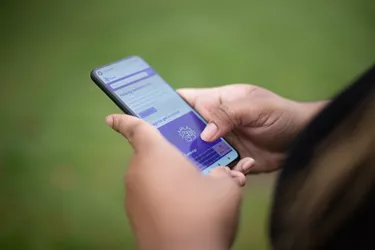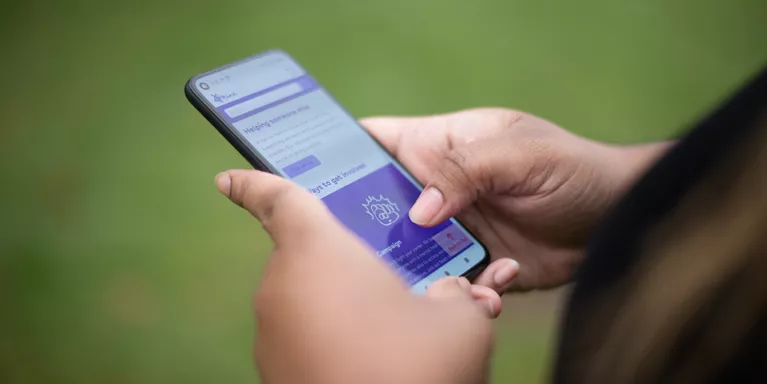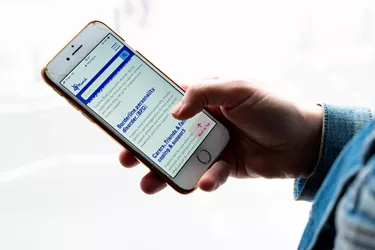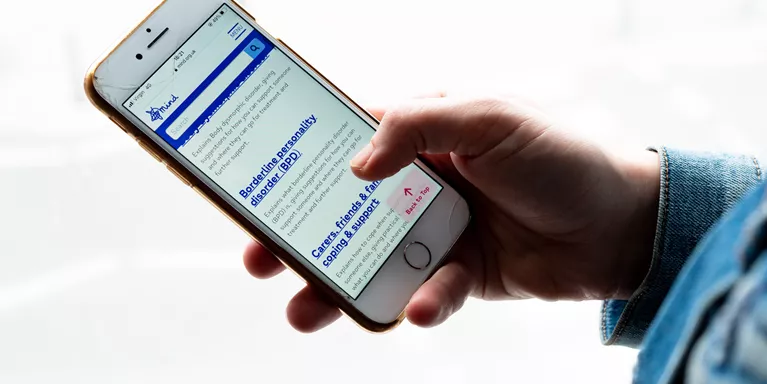Facing anxiety
Ffion, from Caerbryn, describes her struggle with her anxiety, and the importance of Welsh language mental health services.
Content warning: Ffion's story discusses eating problems.
As I look back at my struggle with anxiety it has always been part of me. I remember feeling sick and my heart pounding when I was at primary school. Me and my mum called it “working myself up” and I experienced it when I went out for a meal and to meet friends outside school. I couldn’t understand why this was happening and I was worried from that young age that life would be hard and difficult.
But the anxiety didn’t reach its peak until I was around year 9; this is when I really experienced the effects of anxiety at its worst. I don’t understand why it was in year 9 that it came to a head but I think I was experiencing a lot of change. I was in the middle of the period of maturing; I had my first real boyfriend and I was starting to go out with friends and socialising a lot more with different people.
I still think today about the individuals and their families who might not be able to afford to pay and how difficult things would have been or still are for them.
It was Easter time, and I remember feeling that I couldn’t take any more of this. Every day I opened my eyes and the anxiety would grab hold of me, making my life hell. That’s when I decided that I needed help.
The first place I went for help was the GP but she was unable to work out what the problem was. So, mum and dad decided, as they were so worried, to take me to see a private psychiatrist. I had 3 to 4 sessions with him and he made the diagnosis of anxiety. This diagnosis therefore set me on the right track and as a result I was sent to the CAMHS team in Carmarthen. I think it is important for me to emphasise how lucky I have been to be able to afford to go to see a private psychiatrist, as it costs a lot - about £250 a session. I still think today about the individuals and their families who might not be able to afford to pay and how difficult things would have been or still are for them.
When I started receiving therapy at CAMHS, the first thing I had to target was my weight. One of the biggest effects that I experienced as a result of the anxiety was that I found it extremely difficult to eat, as I was very afraid that I was going to be sick. As a result of this, I avoided and was unable to eat which caused me to become substantially underweight. I remember they told me that if I didn’t increase my weight quickly, I wouldn’t be healthy enough to attend school. I was put on a special diet that was designed so that I would gain weight.
After I managed to put on enough weight, I moved on to receive CBT therapy at CAMHS to try to reduce the anxiety. I did things like making my own ‘sick’ out of food, and watching videos of people being sick to try and reduce my fear of being ill which contributed greatly to my anxiety. This had some effect but I still found a lot of things difficult and felt there was a need for something more. This was reinforced as I got significantly worse again after completing my GCSE exams.
I found it difficult to transition from a time when I had a major focus and plenty of things to do to a period when I had plenty of time to think and to start worrying, and that’s what I did. I wasn’t sure what to do with myself after the exams. I remember walking up and down the corridor at home, not knowing what to do and as a result the anxiety worsened again. It was decided at CAMHS after this I may need something extra to fight the anxiety and that’s when I started taking antidepressants. I really started seeing a difference by taking the tablets, hand in hand with CBT therapy and pushing myself into situations that caused me anxiety. I was starting to do things in life that I thought we would never be able to do. I was beginning to become more comfortable going on the school bus, going out with friends and I even passed my driving test and attended a sixth-form party. I found this was what worked for me: antidepressants, CBT and pushing myself into situations that make me anxious.
Overall, since around year 13, the anxiety has settled and I do not experience it as frequently, or to the same extremes. I know it’s always going to be part of me and I do experience difficult periods at times, but the difference now is that I’m aware of what the anxiety is and how to deal with it. I know when I’m in the darkness that there’s a better time to come. An example of this is when I found the first year at university extremely difficult, with all the change and uncertainty as I started in Aberystwyth in the middle of the covid period. But I was aware this time that talking helped and so when I started to worry and become anxious, I talked to mum and dad or the counsellor I decided I needed in such an uncertain time. I am happy to say that today I am a much happier person who is ready to push myself and face everything in life.
I also believe that being able to use the language in such a difficult time for me would have been a massive help.
I have to praise the treatment that I have received over the years, as I would not be here today without it. However, I must note that I am extremely disappointed that I was unable to receive any aspect of the treatment through the medium of Welsh. All treatments I have received have been through the medium of English. This is absolutely disgraceful as the Welsh language is counted as one of the official languages of the country and thus I should have the right to receive the services through the medium of Welsh. There would never be a situation like this in a country like France, so why is it allowed in our little country? You can also imagine the fuss and bother that would exist if this particular situation related to the English language. Why is the situation different when we discuss the Welsh language? It’s completely unfair and it’s time for us to see change.
I also believe that being able to use the language in such a difficult time for me would have been a massive help. I have always spoken Welsh, that’s the language I used at home as I grew up, with my friends, as I studied and at work. The Welsh language is important to me and is part of my identity as a person. In a time when I didn’t feel myself at all, and very uncertain about life, being able to use the Welsh language would have helped me feel more comfortable and reminded me of my identity. Discussing mental health problems in your first language is difficult enough, let alone having to add the task of having to translate thoughts and feelings about something you don’t quite understand yourself.
The Mind Cymru campaign is such an important campaign. They are drawing attention to a problem that should have been solved many years ago, a problem which should not exist at all. Support the campaign! The charity is campaigning to change things for the better, to get more support through the medium of Welsh for the benefit of all Welsh-speaking people. You don’t know, it may be you or someone you care about who will need it at some point, so please support!

Our campaigns
We'll fight your corner. We believe everyone with a mental health problem should be able to access excellent care and services. We also believe you should be treated fairly, positively and with respect.
Share your story with others
Blogs and stories can show that people with mental health problems are cared about, understood and listened to. We can use it to challenge the status quo and change attitudes.















